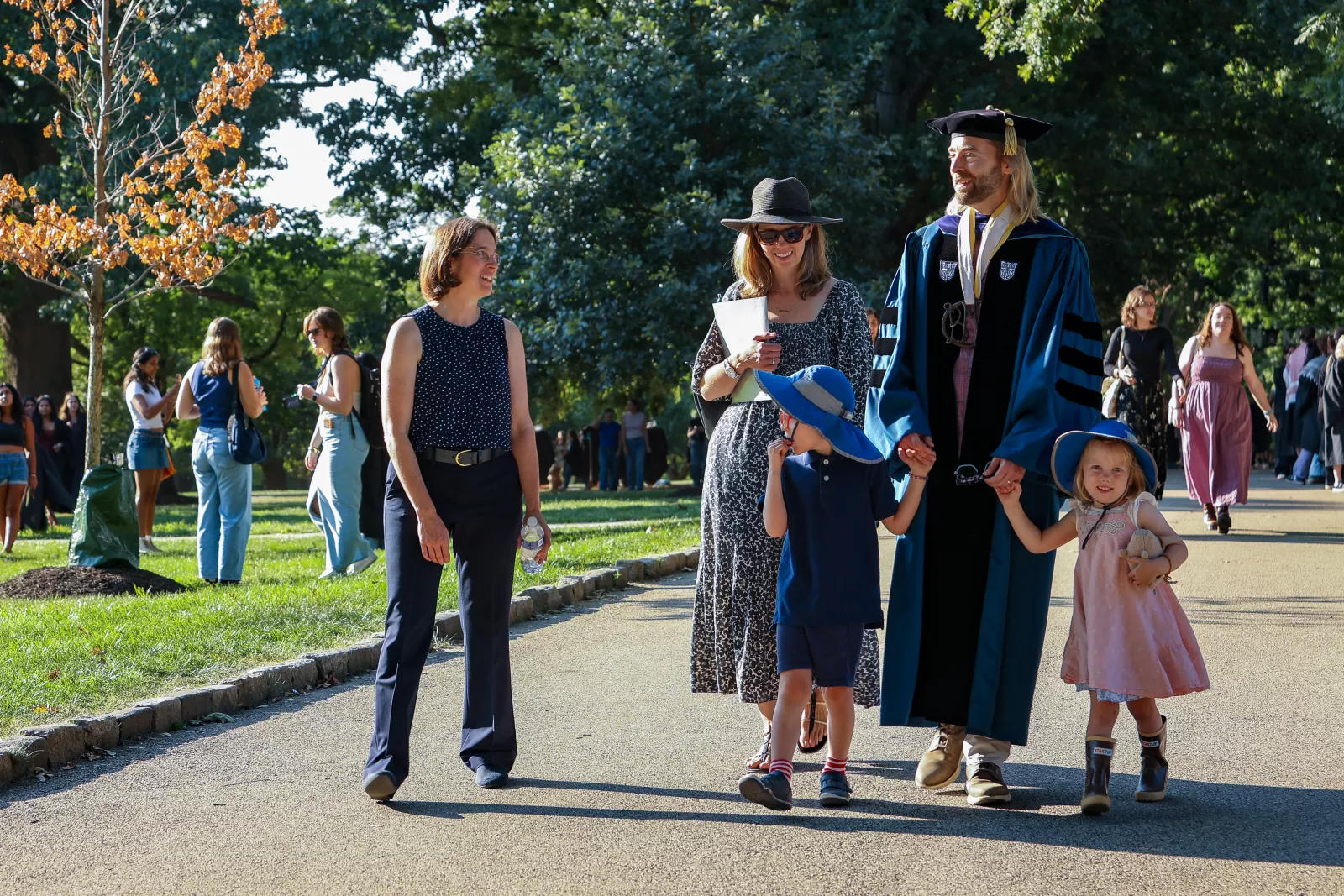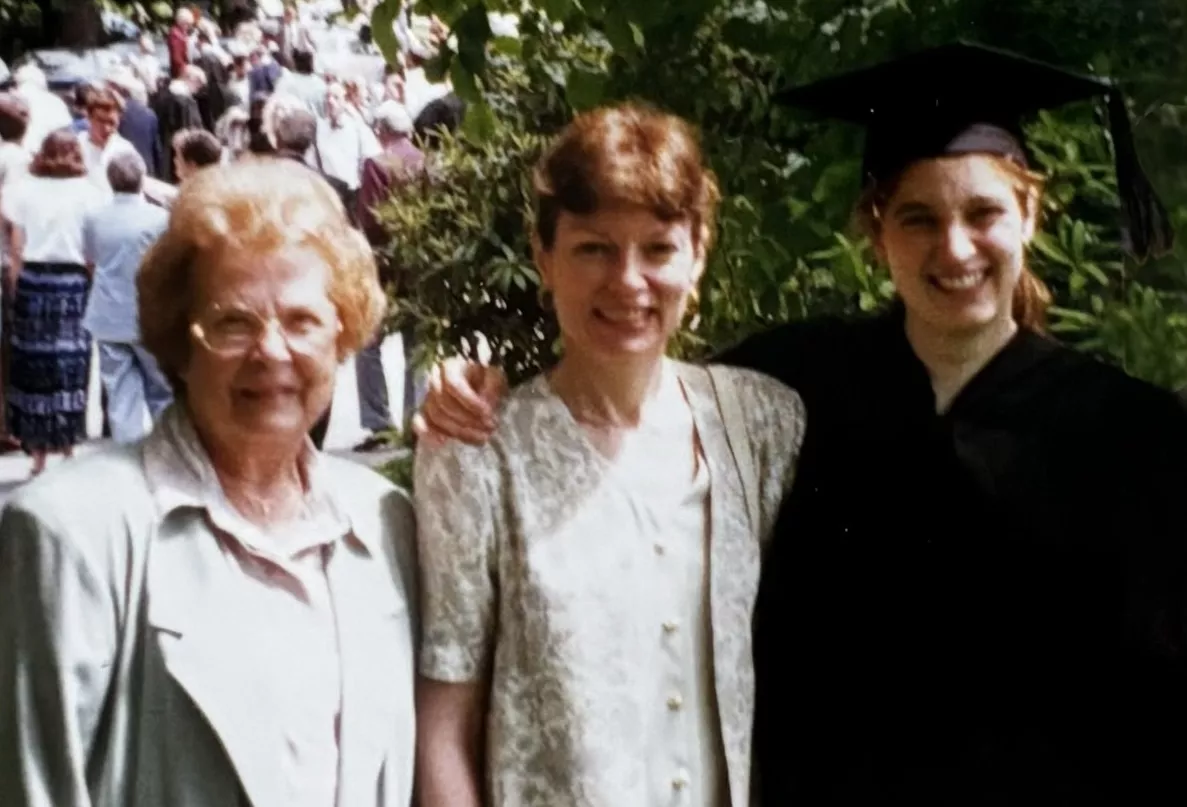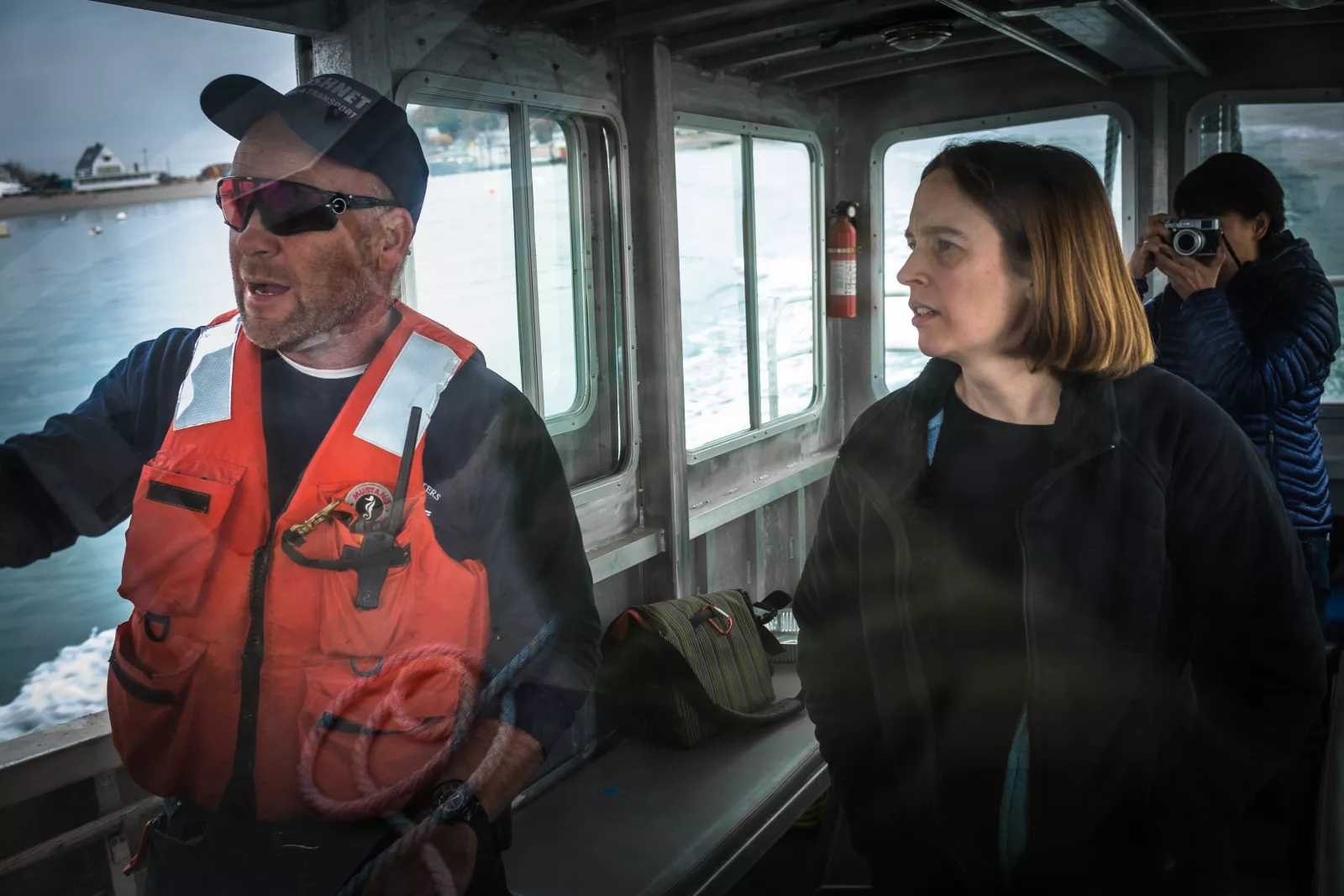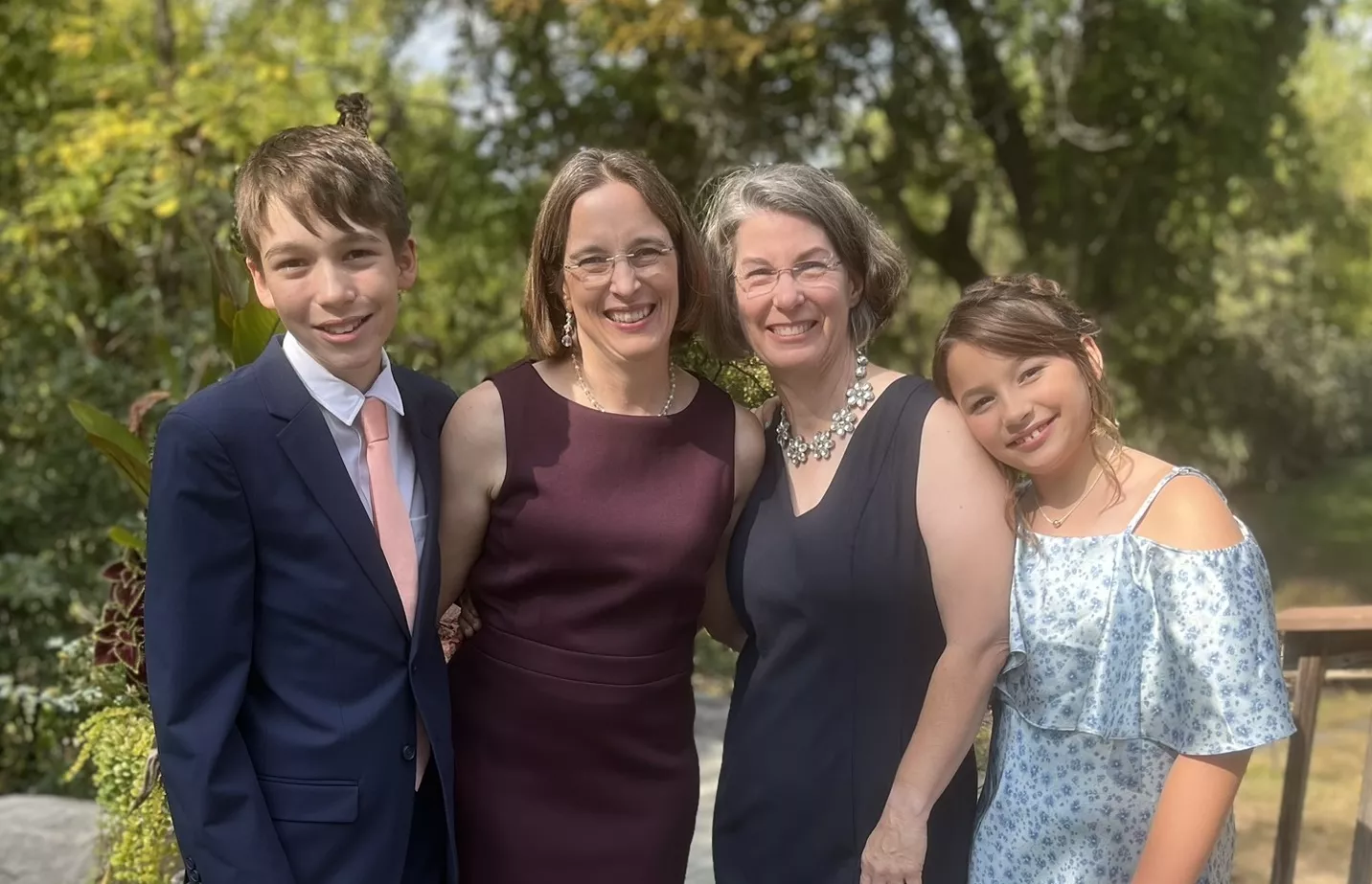Leaning In
President Wendy Cadge is ready to chart a 21st-century course for Bryn Mawr and make a case for the liberal arts.
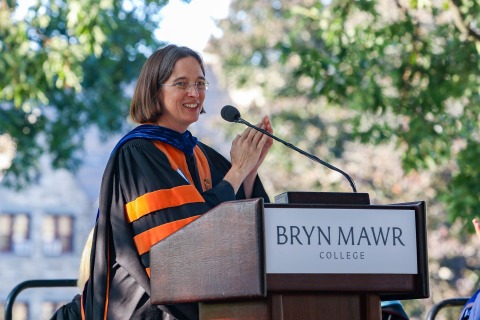
It wasn’t even the first day of classes, and Wendy Cadge had already filled three notebooks. But Bryn Mawr’s 10th president wasn’t trying to ace a test; Cadge’s objective was charting a 21st-century course for the College to raise its profile in the challenging field of higher education. And Cadge was going about that the way she knew best: as a sociologist. She met with departments and asked questions. She visited with the transportation team, dining services, housekeeping, and campus safety officers. And, yes, she took a lot of notes.
“I’m trying to be a sponge,” she says.
After all, Cadge is an institutional ethnographer. She has interviewed people in hospitals and prisons, ports and religious organizations in Philadelphia, Boston, and across the country. Cadge’s curiosity led her to degrees in sociology and anthropology, and religion; earned her a master’s and Ph.D. from Princeton; and took her to Sri Lanka on a Fulbright Fellowship. She was a member of the faculty at Bowdoin College, had a postdoctoral fellowship at Harvard University, spent a year at the Radcliffe Institute, and served in a range of faculty and administrative roles at Brandeis University, most recently as the dean of the graduate school of arts and sciences. She has written more than 100 scholarly and general interest articles—many in collaboration with students and colleagues across disciplines—and four books on issues related to spiritual care, religion in hospitals, Buddhism in the United States, and port chaplaincy. Cadge also co-founded the Chaplaincy Innovation Lab. Now her curiosity and sense of adventure have led her to Bryn Mawr.
“This was a new direction, a new adventure, and she jumped in headfirst,” says colleague Michael Skaggs.
Cadge didn’t go looking for a college presidency, but she saw Bryn Mawr as an incredible opportunity—a liberal arts college with a creative and diverse team that was mission-focused and would allow her to continue her scholarship.
“The liberal arts are about engaging with people at a pivotal developmental time and helping them learn for themselves what it means to be who they are and how they want to move through the world,” she says. It’s not about giving them the answers to questions, she adds, but rather teaching them how to shape and engage with those questions, in today’s complicated and often difficult world.
“The liberal arts change lives," she says.
A year ago, as part of the application process, Cadge wrote a thoroughly researched multipage talk in response to a prompt from the search committee. It showed the level of dedication they could expect from a President Cadge.
“Wendy impressed our committee as a bold and creative leader and scholar who is deeply committed to student and faculty excellence and embodies inclusivity at her core,” says trustee Amy Loftus ’90, who chaired the search committee.
Board of Trustees Chair Cynthia Archer ’75 agreed she stood out in the field of talented candidates. “I am confident that she will combine forces with our exceptional community to lead Bryn Mawr to new heights of vibrancy and excellence.”
Colleagues praise her collaborative nature, how she uplifts others, how she organizes and takes action. Cadge has a unique ability to focus intently on a project then quickly pivot to the next, says Skaggs. “Her energy and focus seem to be an order of magnitude greater than anyone else.”
FROM INSPIRATION TO ACTION
Cadge grew up with five grandmothers—her parents and grandparents were divorced—and she says she thinks of her grandmothers every day.
They were white working-class women; one folded sheets at Gimbel’s, another worked at a bank. Only one went to college. They engaged their minds by playing cards, working puzzles, sewing, and crafting. Cadge has their photo in her office, and folded on a chair in the corner is a quilt her mother made. It’s an everyday reminder of how the women of her family paved the way for her.
Their work instilled in Cadge a deep commitment to hard work in all its forms and to making colleges like Bryn Mawr accessible not just financially, but also in a way that enables students from broadly different backgrounds to really belong.
Cadge has studied religious organizations for decades, researching how people find meaning and purpose, how they build community. She says she sees many parallels in higher education, which today faces challenges from affordability to demographic shifts that mean there are fewer college-age young people than there used to be. Many colleges are pivoting in response.
As president, one of Cadge’s most important roles is to collaborate with the community to design and then implement a path forward—to demonstrate not just how transformative a liberal arts education can be, but show how Bryn Mawr has been and remains a shining example of that potential.
“My most important job is to help build a strategic vision for the college’s next chapter and to do so in a way that deeply reflects the college’s history, mission, and values, and situates the college clearly on the higher education landscape,” Cadge said.
To do that, she is reading, meeting with people, taking notes, testing out ideas. Her experience as a sociologist helps her to understand the complexity of organizations, to see all the different parts as a whole.
“There are some people that are really good at strategy, and there are some people that are really good at operations. I like to work with diverse collaborative teams so we can do both,” Cadge says. “Part of what we are partnering with the board on is building a strategic vision for the college’s next chapter, and then we are going to work together with the whole community to make that vision a reality.”
Undergraduate student Adalia Rodriguez ’24, who was one of two student members of the search committee, praised Cadge’s collaborative nature. “When it comes to innovation or solving an issue,” she says, “she will always work with the community to find the best approach, even if she has many of her own ideas.”
BUILDING COMMUNITY
At Brandeis, as dean of the graduate school of arts and sciences, Cadge worked to build community among the students and alumni. Her achievements included centering the graduate student experience by rebuilding and expanding student professional development, collaborating to extend degree programs into new modalities, advancing the graduate school’s anti-racism plan, and reconnecting current students and alumni to celebrate the school’s 70th anniversary. She received numerous awards recognizing her work. She also served as the senior associate dean for strategic initiatives; led the Division of Social Sciences, chaired the Women’s, Gender, and Sexuality Program; and was named one of the three inaugural Barbara Mandel Professors of the Humanistic Social Sciences.
In addition to her academic work and research, Cadge somehow found time to create a network for chaplains and spiritual care providers where they could engage with the best research, build community and access resources. Through her research, Cadge discovered that chaplains were all over—in health care organizations, in the military, in prisons, in airports, and on container ships—yet they were isolated from one another. She didn’t hesitate, didn’t do more research; she just pitched a tent.
The Chaplaincy Innovation Lab, which she co-founded with Skaggs, started as a website in 2018, bringing chaplains together from all walks of life. That Cadge sensed the need for that kind of community proved prescient. When COVID hit, “within a week we had 1,000 people in a Zoom room because the chaplains were all trying to figure out how to be a support at a distance,” Cadge said.
She recalls how a hospital chaplain told her about the difficulty she was facing watching COVID-19 cause massive amounts of loss and suffering. “She said, ‘I’m not sure what I need to do, but I feel like I need to talk to a military chaplain, because they are used to this degree of acuity,’ and we said, ‘no problem.’ It’s just a simple introduction, but it’s about building trusting relationships and being clear about intent and caring.”
The two chaplains, working in isolating jobs in a further isolating time, were able to support one another.
“I think that in any community Wendy is involved in, her overarching priority is the well-being and thriving of everybody in that community,” Skaggs says.
“I think that extends from helping the early career scholars that she’s coauthoring a paper with to being intentionally supportive of people working for her. She wants to make sure everyone is happy, healthy, and taken care of, and she will go to enormous lengths to make that happen.”
EMBRACING HOME
Cadge grew up in Delaware County and attended Swarthmore where, even as a local, she sometimes felt like an outsider, but dove into the challenging academic work.
“She was very hardworking, very smart, very collaborative,” recalls Swarthmore classmate and Bryn Mawr Postbac ’99 Abraham Nussbaum. “It was clear that she was intended for big things.”
This summer, Cadge; her wife Deborah; their middle-school-age children; and their menagerie of dogs, cats, and even a frog, made the move from Massachusetts to Bryn Mawr. Now that she is back, Cadge can’t wait to take her family tubing on the Brandywine River or to the beach—anywhere she can dive into a good book beside the water.
At the end of the summer, the kids spent time with her parents and sisters, who Cadge says were “beaming constantly” and texting her photos of them together.
There is also plenty to explore with Bryn Mawr’s campus as a backyard, from the fountains behind the library to the community garden. The presidential pugs in their Bryn Mawr kerchiefs have been a hit with the students at campus events.
“I love that people really know each other,” Cadge says. “It feels like a very thoughtful and engaged community.”
And sure, it’s a big change. But one Cadge is excited about.
“It’s an adventure, right?” she says. “This is how we frame it to our kids, that we have been invited on an adventure and we’re thrilled to be here, and you never know where it is going to lead. Some of it will be great, and some of it will probably be really difficult, and the opportunity to be on the journey, and learn together as we go, is a gift.”
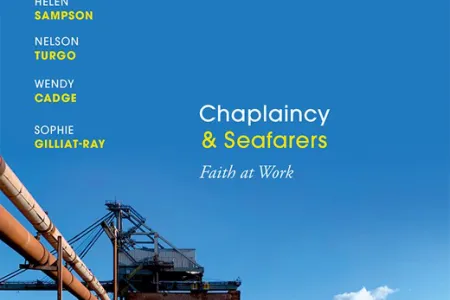
Released this past June by Oxford University Press, Chaplaincy and Seafarers: Faith at Work was coauthored by President Cadge.
The book provides a detailed account of seafarers’ attitudes to working in mixed-faith crews, their understandings of their own faith and its role and negotiation in a life at sea, and their needs with regard to faith and more general welfare support.
Research included analysis of archival materials, fieldwork in ports and on cargo ships, and interviews with chaplains in the United Kingdom.
Published on: 10/21/2024
